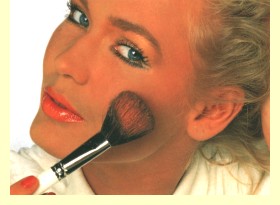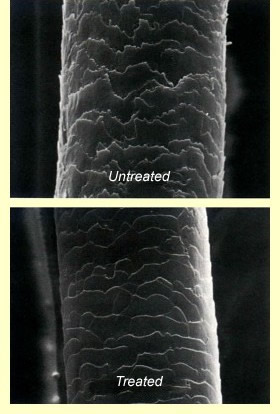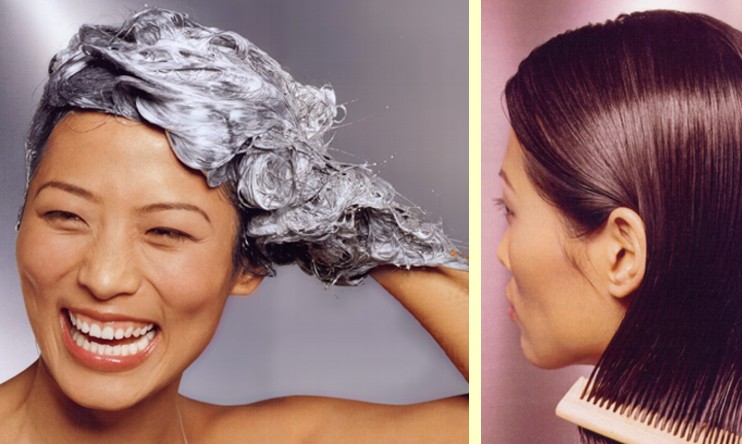  Silicones
and Good Looks Silicones
and Good Looks
Ever since silicones appeared on the market,
they have had a growing impact on cosmetics.
 |
 |
Whether make-up or shampoo, creams, deodorants or
other cosmetic products, they all contain silicones.
Silicones are impressive not only for their desirable
properties but also for their high skin tolerance and
dermatological compatibility.
Linear polydimethylsiloxanes (in this industry sector
called dimethicones) are used in many hair-care products.
These fluids cover a wide range of viscosities. They
range from the volatile to the high-viscosity grades.
In combinations with the right hair-care preparations,
they impart suppleness and natural shine to the hair. |
 |
| A look at
the following photomicrographs of a single hair clearly
shows how these hair-care agents work. |
 |
 |
  The
upper, untreated hair shows a very irregular, rugged
surface structure. Consequently, it looks dull and
not very sleek. The
upper, untreated hair shows a very irregular, rugged
surface structure. Consequently, it looks dull and
not very sleek.
An appropriate shampoo will “repair” the
surface and make the hair look shiny and sleek again
(lower picture).
Organically modified polydimethylsiloxanes,
so-called phenyldimethicones, feature good compatibility
with
other conditioning raw materials. When used as components
of shampoos, they intensify the shine and natural
color of washed hair.
Glycol-modified products have excellent
surfactant properties. They provide good wetting
and adequate
levels of softening, thereby preventing the hair
from drying out.
Suitably modified products protect
roughened brittle hair against further damage by enveloping
and
nurturing
it. |
 |
| Hair is not just hair. Asian hair is relatively thick and heavy, and the strands are cylindrical, while European hair is thinner, less heavy, and the strands are elliptical. Special, silicone-based products for shampoos and conditioners are formulated such that they provide the right care for every kind of hair, giving it more volume, enhancing sheen, and making it softer and easier to comb. |
 |
  Silicone waxes contained in skin-care agents, sunscreens, deodorants, foundations and lipsticks make it easier to spread these products evenly on the skin. WACKER’s BELSIL® silicone grades are excellent in this respect on account of their solubility and low melting temperatures between 35 and 80 degrees Celsius. Accordingly, they are found in many cosmetics. Silicone waxes contained in skin-care agents, sunscreens, deodorants, foundations and lipsticks make it easier to spread these products evenly on the skin. WACKER’s BELSIL® silicone grades are excellent in this respect on account of their solubility and low melting temperatures between 35 and 80 degrees Celsius. Accordingly, they are found in many cosmetics. |
|
|